20 Reasons To Give Up Sugar
It is definitely not all sweet when it comes to sugar.
Added sugars contain a whole bunch of calories with NO essential nutrients. For this reason, they are called “empty” calories.
There are no proteins, essential fats, vitamins or minerals in sugar… just pure energy.
In addition, you don’t always see the word “sugar” on a food label. It sometimes goes by another name, like these:
- Agave nectar
- Brown rice syrup
- High-fructose corn syrup
- Fructose
- Dextrose
- Evaporated cane juice
- Glucose
- Lactose
- Malt syrup
- Molasses
- Sucrose
- Cane sugar
- Coconut sugar
- Date sugar
- Sorghum syrup
- Fruit juice
- Maple syrup
Watch out for items that list any form of sugar in the first few ingredients, or have more than 4 total grams of sugar.
When people eat up to 10-20% of calories as sugar (or more), this can become a major problem and contribute to nutrient deficiencies.
Let’s discuss some of these issues:
1. WEIGHT GAIN
Sucrose or sugar has two components – glucose and fructose.
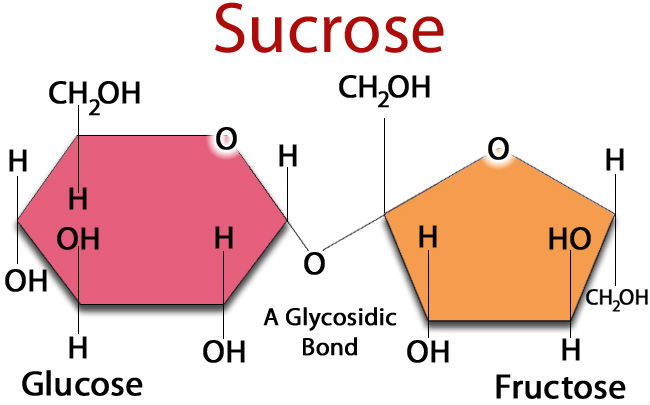
Glucose is present in virtually all naturally-occurring sweet foods and also exists as starch (although in a different chemical form, so it doesn’t taste sweet).
Fructose occurs naturally in fruit, honey and some vegetables. But the main sources of fructose in the typical western diet are processed foods and beverages that contain added sugar derived from sugar cane or sugar beet.
Ingested fructose is treated differently to glucose following digestion and absorption into the body. Glucose is readily transported around the body to where it’s needed as an energy source. Fructose, however, is not essential to our functioning in any way.
The only organ than can metabolize fructose is the liver, because only the liver has a transporter for it. When large amounts of fructose enter the liver and it is already full of glycogen, most of the fructose gets turned into fat. In fact, fructose can turn into fat in less than FOUR hours.
Fruit is a real food with vitamins, mineral, fibre, and lots of water. Unlike vegetables, however, fruits also contain a large quantity of sugar overall, with little or no protein. So it’s important to have no more than 2 servings of fruit daily, and ideally with some protein/fat to curb any sugar imbalances. For instance, nuts and a piece of fruit.
HOW MUCH FRUCTOSE CAN I EAT PER DAY?
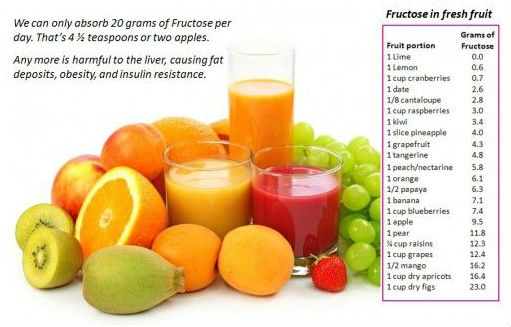
2. CONSTANT HUNGER
Sweet foods and drinks stimulate our sweet tooth – so the more sweets we eat, the more we want. Eating lots of sugar and simple carbohydrates just makes us hungrier.
Poor blood regulation can lead to big swings, causing dangerous highs and lows. The drops in blood sugar can make you feel angry when you’re hungry, sometimes call “hangry”.
3. LOWERED IMMUNITY
Sugar lowers the white blood cell count and therefore our immune system, increasing our risk to infection and disease states.

4. MOOD IMBALANCES
When our blood sugar is high, it give us energy and makes us feel happy. But when it drops, it can make us feel tired, sad and low. Naturally, we reach for more of what gave us that boost, which puts us on a roller-coaster ride that causes our mood to be very unstable. These sugar highs and lows can lead to increased risk of serious mood disorders, such as anxiety and depression.
5. FATIGUE
Sugar and simple carbohydrates do not supply lasting energy. It only spikes our blood sugar and then causes a crash, leaving us without energy. And so begins the “sugar roller-coaster” in an attempt to get energy again.
6. INFLAMMATION
A diet high in sugar raises our inflammation, which in turn raises our risk of chronic disease.
7. DIGESTION ISSUES
Leaky gut has been linked to excess sugar intake. Sugar is inflammatory and causes the tight junctions in the gut to open and “leak” undigested food particles into the bloodstream, further straining the immune system.
Sugar also causes an imbalance in healthy gut bacteria, creating dysbiosis, and chronic overgrowth of bacteria and fungi.
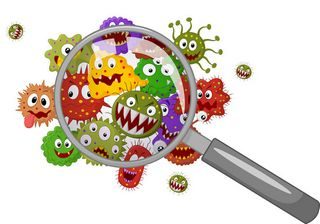
8. TOOTH DECAY AND CAVITIES
Tooth decay is caused by bacteria in the mouth using sugar from foods and drinks to produce acids that dissolve and damage the outer surface of the tooth enamel.
Cavities are a bacterial infection created by acids, that cause your teeth to experience a hole in them. Without treatment, cavities can progress past the enamel and into the deeper layers of the tooth, causing pain and possible tooth loss
9. DIABETES
When we spike our blood sugar over and over again, our body eventually becomes less effective at lowering it, resulting in insulin resistance. Insulin resistance is a precursor to type 2 diabetes (and possibly type 3 diabetes, also known as Alzheimer’s Disease).
Insulin resistance makes our body less able to process sugars, leading to fatigue, hunger, and weight gain. However, often it has no obvious symptoms. This is why many people have no idea that they have it.
10. HEART DISEASES/STROKE/METABOLIC SYNDROME
Excess sugar consumption increases our risk of heart attack and stroke by 50%.
Soft drinks or sodas are the worst offenders for heart health, with drinking one soda can a day increasing heart disease risk factors by 20%. Diet sodas are even worse due to the artificial sweeteners used. Drinking diet sodas are linked with a 44% increased risk of heart disease.
Metabolic syndrome or Syndrome X is not a disease in itself. Instead, it’s a group of risk factors – high blood pressure, high blood sugar, unhealthy cholesterol levels, and abdominal fat. The two most important risk factors for developing the condition are central obesity (excess fat around the middle and upper parts of the body) and of course, insulin resistance.

11. KIDNEY DISEASE
Drinking soft drinks or sodas causes elevated levels of protein in our urine, which can be an indicator of kidney problems.
12. FATTY LIVER
Diets high in sugar (especially fructose) strain the liver, contributing to the development of non-alcoholic fatty liver disease.
Our liver only has a limited capacity to handle fructose and sugar. Eating these overwhelms our livers, causing them to get fatty.
13.OSTEOPOROSIS
Elevated blood sugar levels and oxidative stress are contributing factors in the development of osteoporosis.
14. HORMONE ISSUES
A diet high in sugars, especially fructose, can interrupt our sex hormones, leading to fertility issues, PCOS, and endometriosis.
This is mostly due to the strain sugar puts on the liver to metabolize the fructose. The liver is very important for detoxing hormones.
In addition, diets high in sugar and simple carbohydrates can increase the conversion of testosterone to oestrogen, a process called aromatization. This leads to oestrogen dominance conditions in men and women.
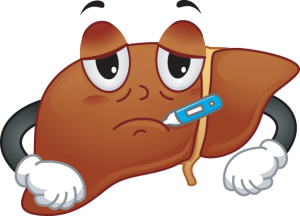
15. ACCELERATED AGING
Sugar creates something called Advanced Glycation End Products (AGEs), which damages the collagen and elastin in our skin, causing our skin to sag and look more wrinkled.
16. BRAIN FOG, POOR MEMORY, ALZHEIMER’S
Insulin resistance can lead to lower levels of insulin in the brain, which over time could lead to memory problems, dementia, and Alzheimer’s or type 3 diabetes.
In terms of brain health, sugar, carbohydrates and wheat are the brain’s silent killers.
17.SLEEP ISSUES
Poor blood sugar regulation can cause your blood sugar to dip in the middle of the night, causing you to wake up.
Also, needing to get up and go to the toilet several times at night can be a signal that the kidneys are working overtime due to elevated blood sugar levels.
18. THYROID ISSUES
Poor blood sugar regulation can cause thyroid hormone production to fall and thyroid antibodies to spike. It can also weaken the adrenals (which work in conjunction with the thyroid).
Researchers have found that 50% of Hashimoto’s sufferers have impaired carbohydrate metabolism.
19. CANCER
Research shows sugar fuels cancer cells, whilst malignant cells die when starved of glucose.
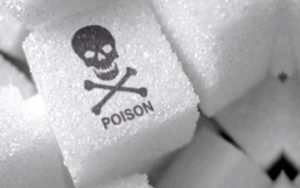
Cells in the human body can absorb levo-rotatory (left spinning) molecules, while cancer cells can only utilize dextro-rotatory (right spinning) molecules.
Essentially, fruits in their natural state (i.e. organic) contain left spinning sugars, whereas GMO-influenced fruits consist only of right spinning sugars. It is therefore vital to choose organic fruits whenever possible.
All added sugars (especially artificial sweeteners) and simple carbohydrates are dextrorotatory, and hence, cancer feeding.
20. INCREASED RISK OF DEATH
Sugar consumption is linked to an increased risk of death of all causes, in both normal weight and overweight individuals.
Those whose diet was comprised of 17-21% added sugars had a 38% higher risk of dying from a heart attack. The risk was doubled for those who got more than 21% of their diet from sugars.
